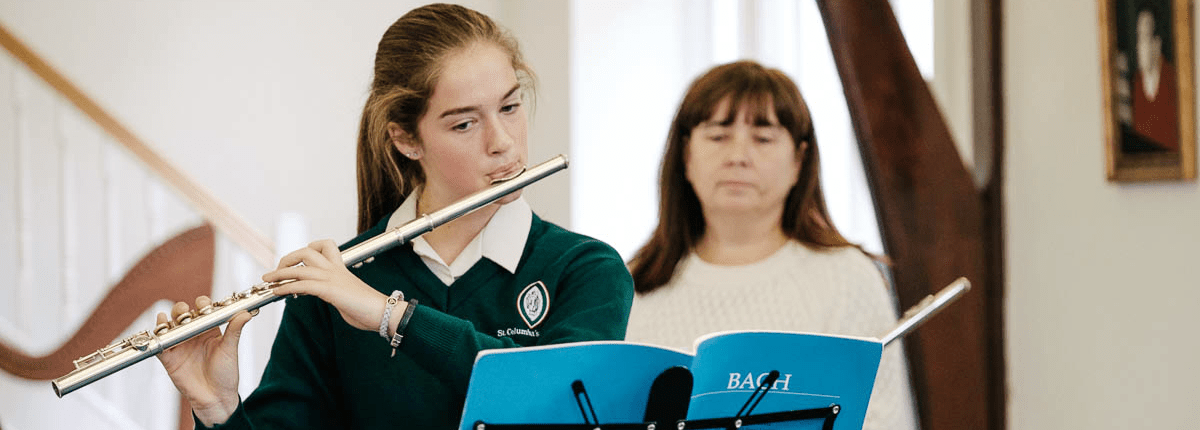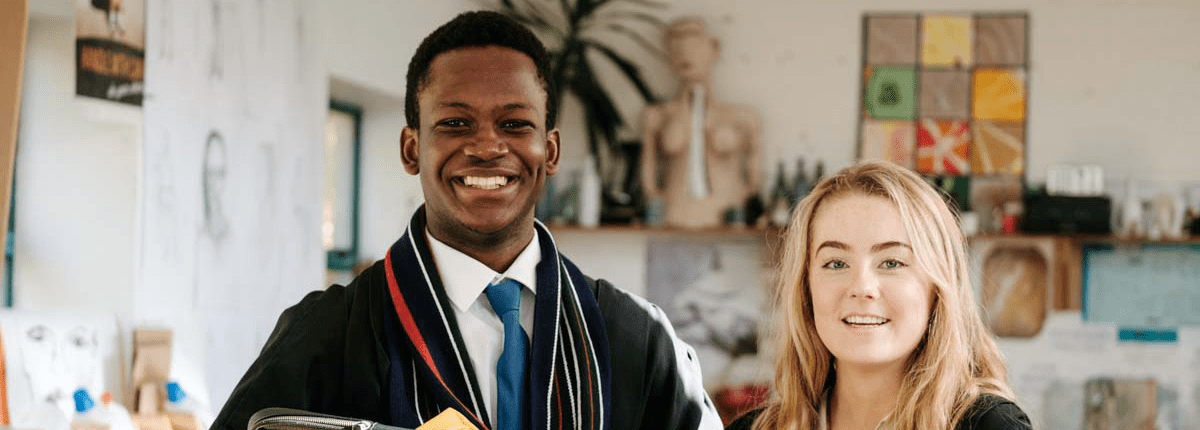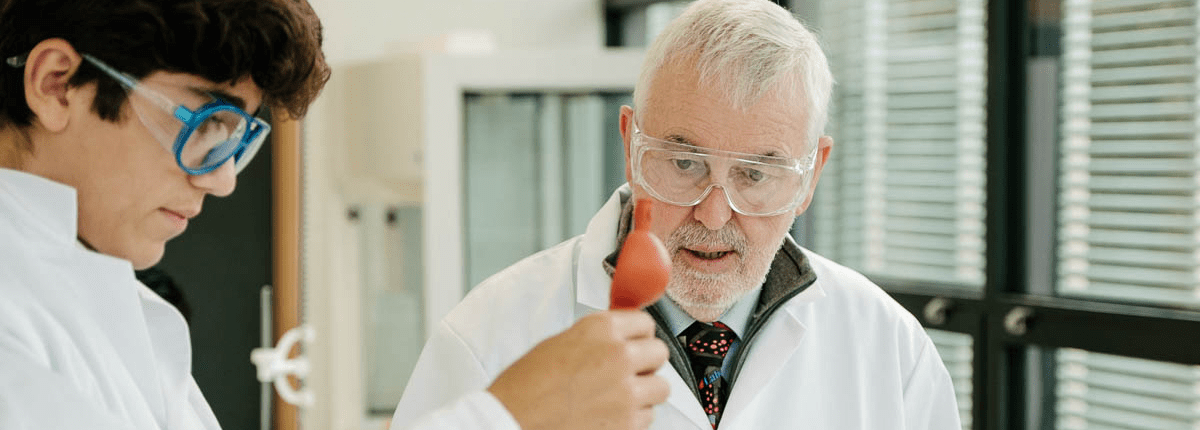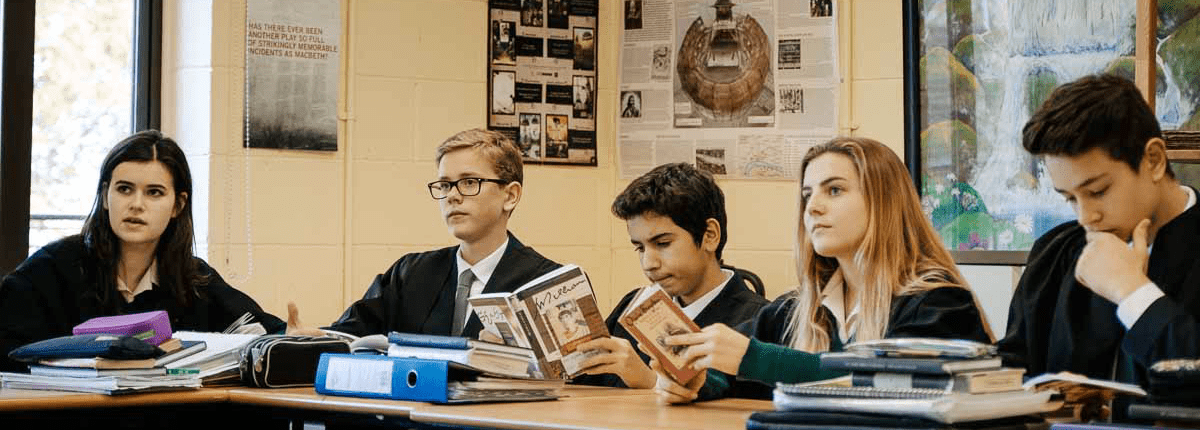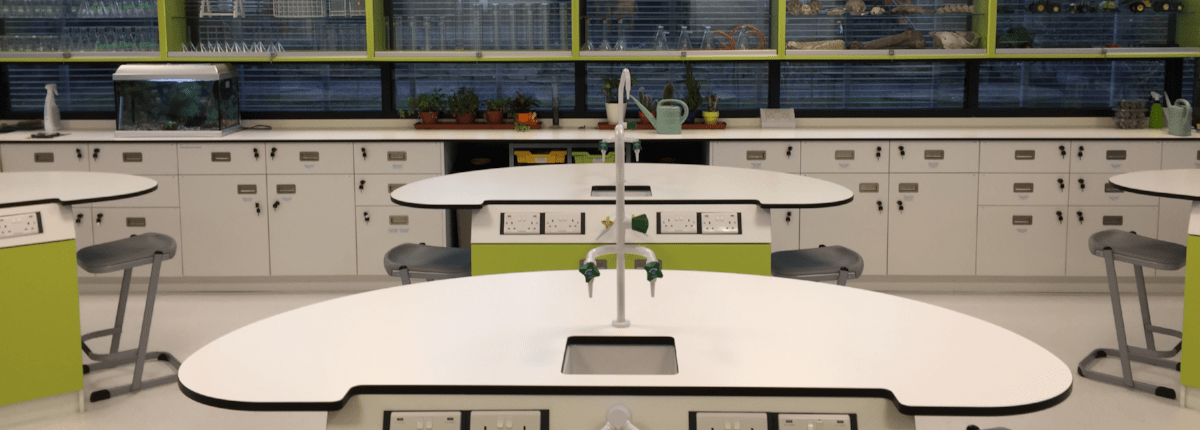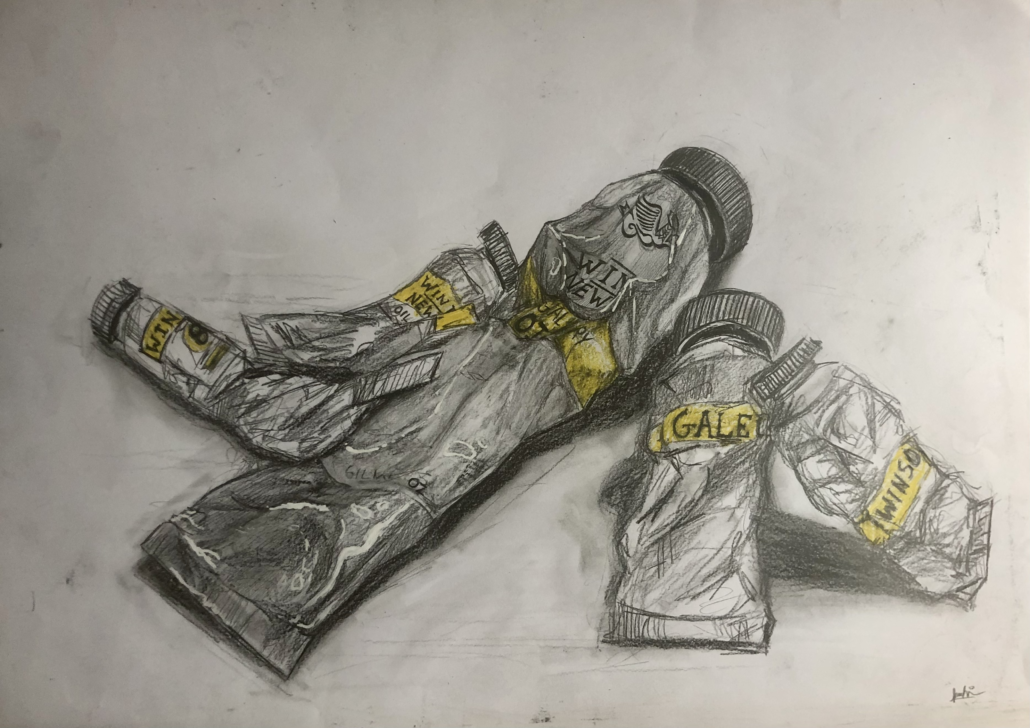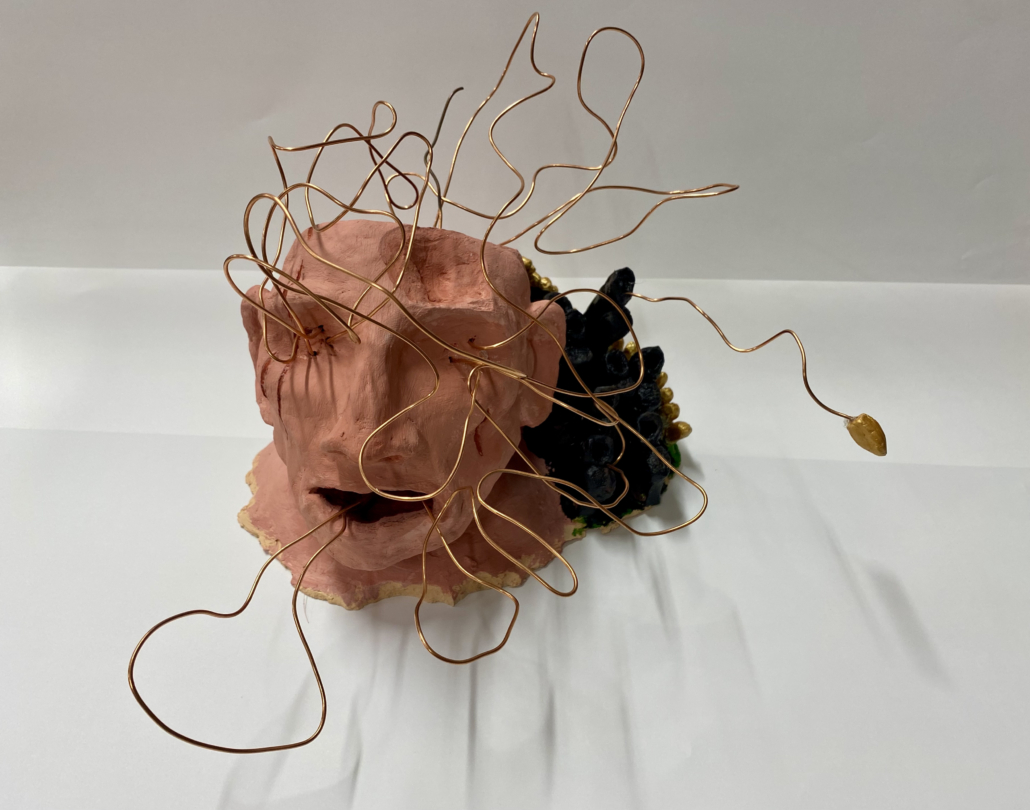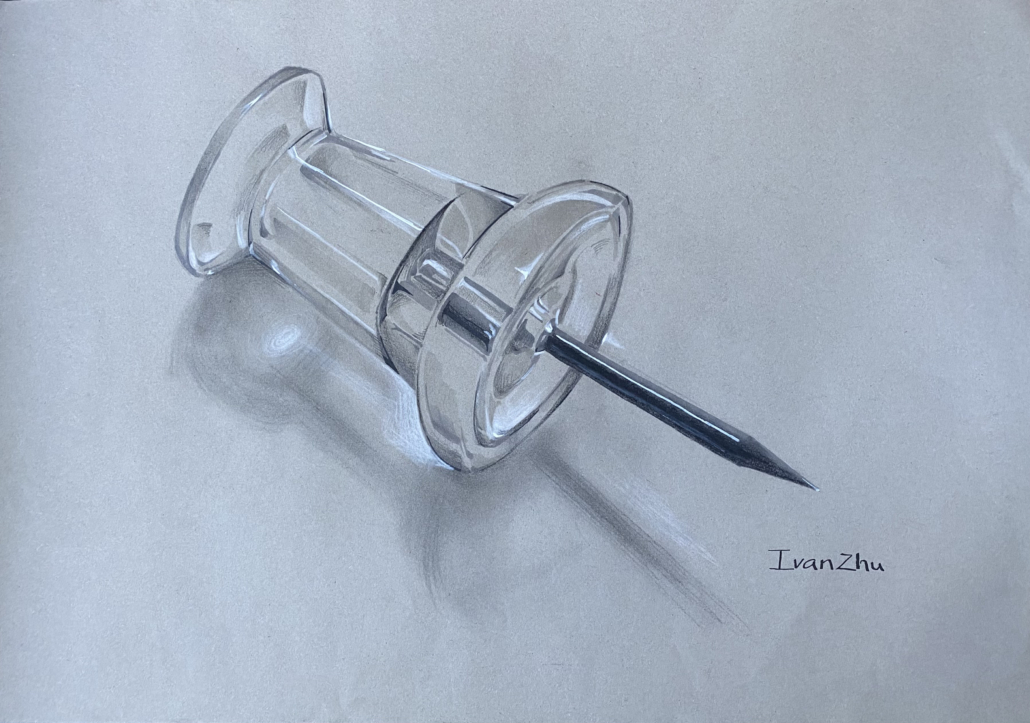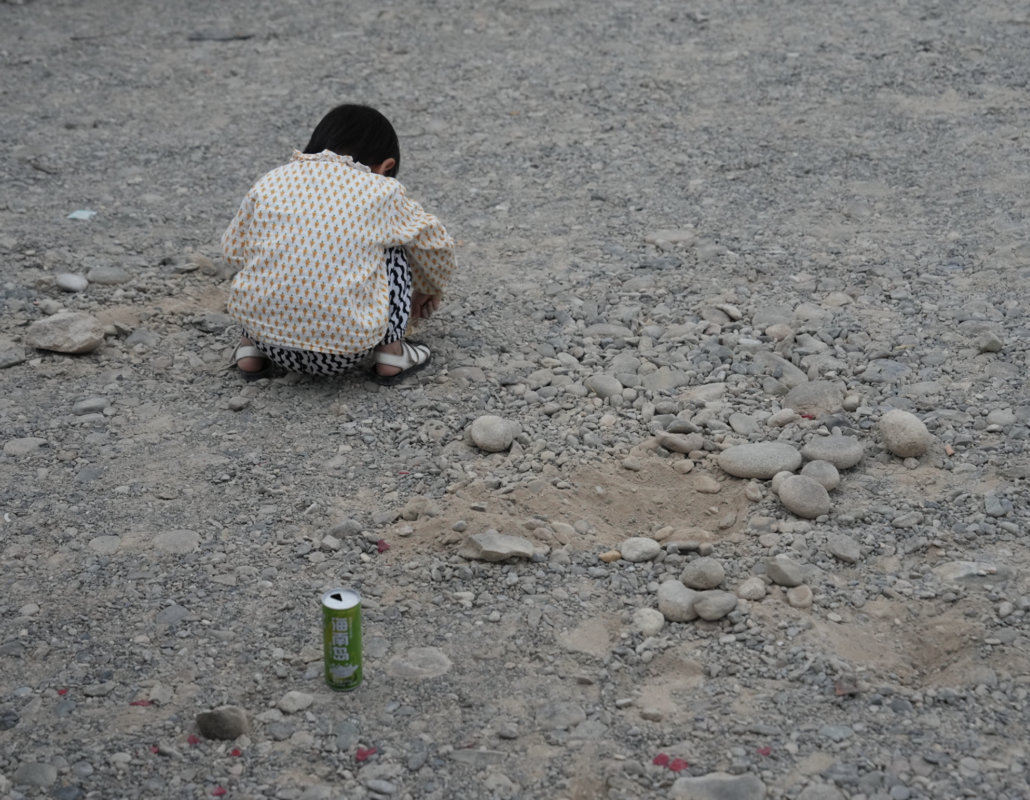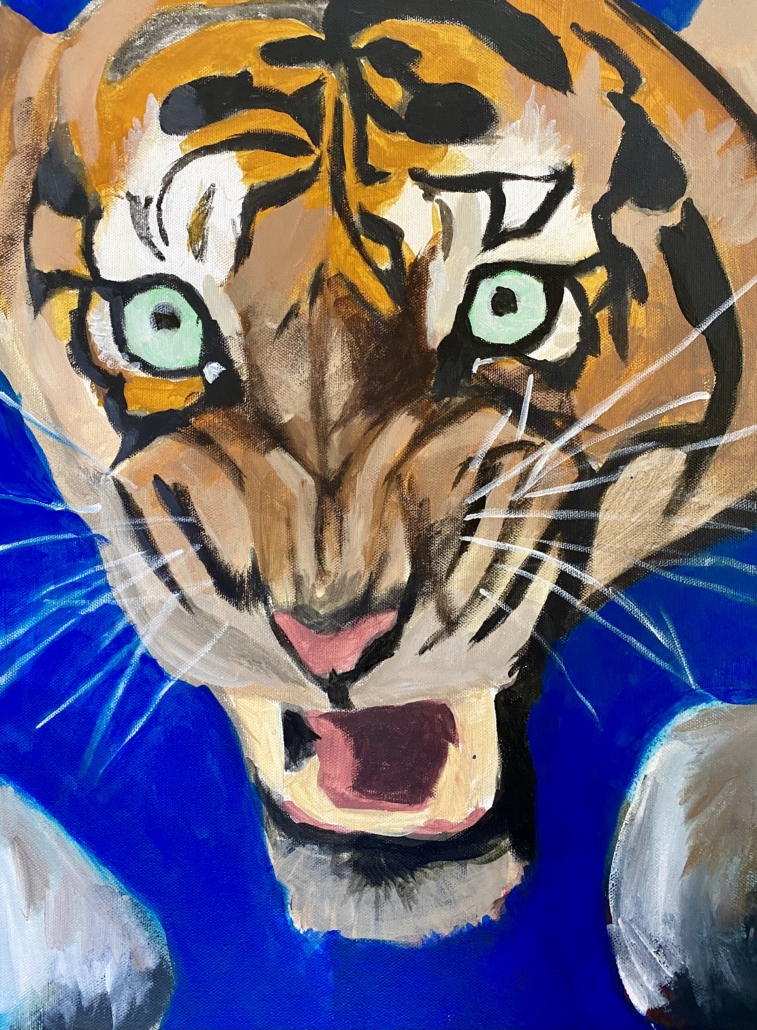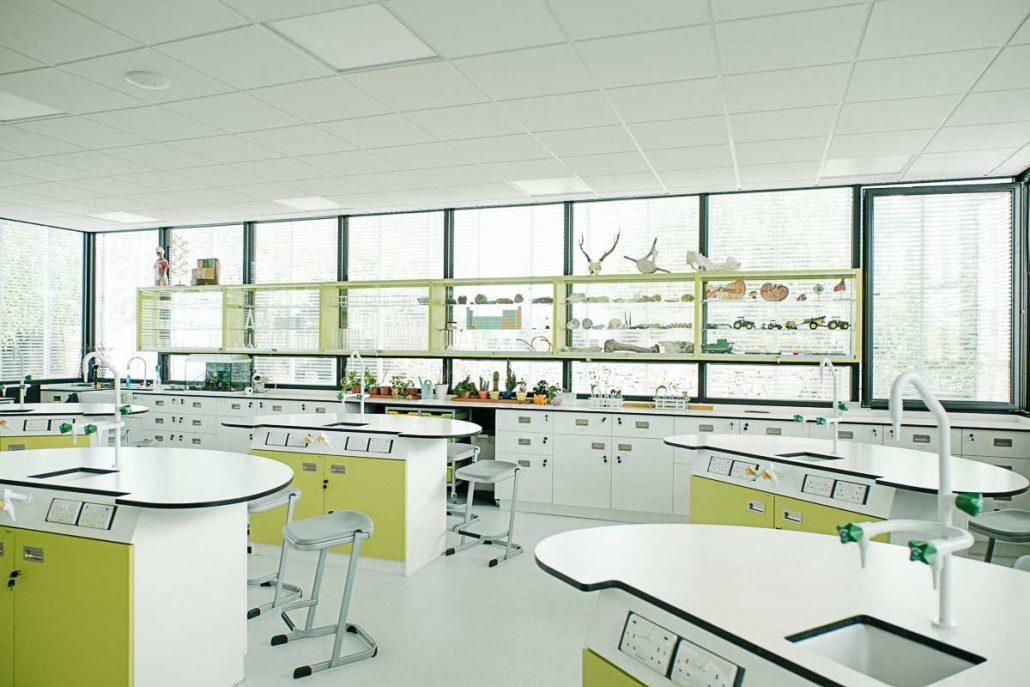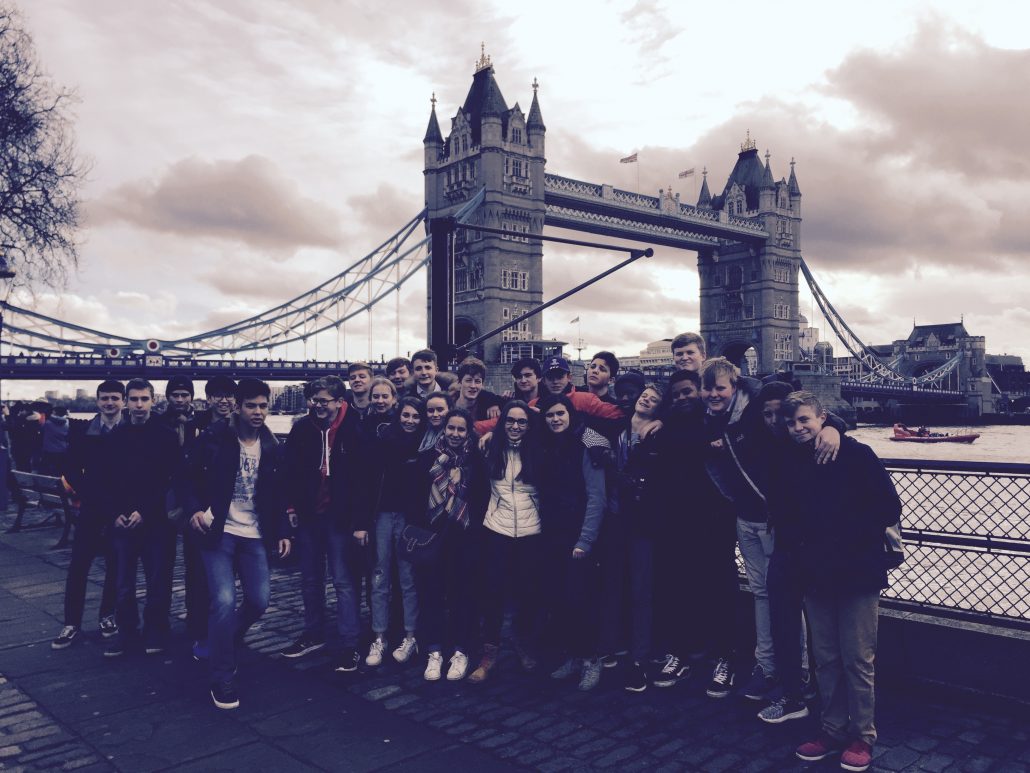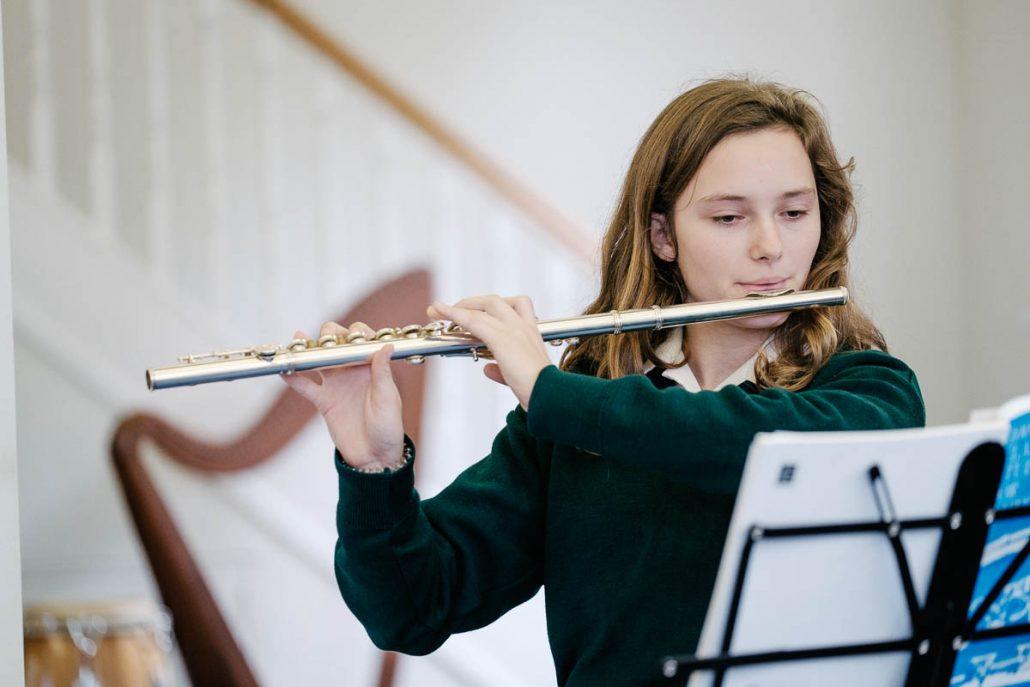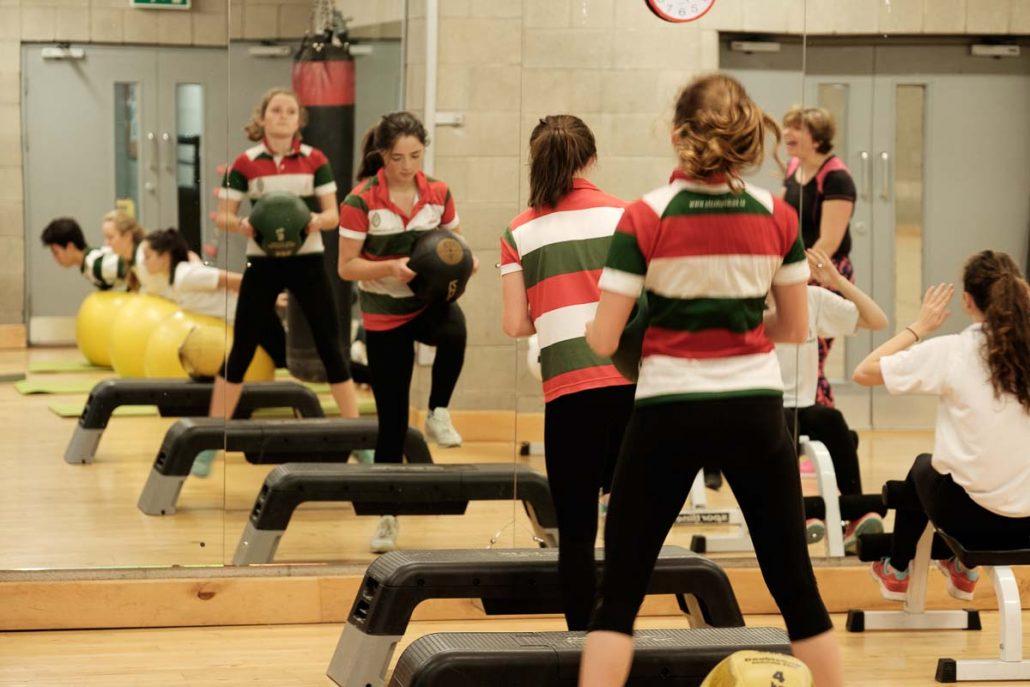Accounting
Introduction
Accounting provides pupils with the knowledge, understanding and skills in accounting and financial management necessary for managing personal and basic company accounts.
Department Staff
I O’Herlihy, BA, PDE
Overview
Accounting is an optional subject and is currently offered as a Q Set option in Forms V and VI (two classes per week). All classes are of mixed ability.
Senior Cycle
The learning experiences in accounting develop students’ organisational, logical thinking, planning and problem-solving skills for their future life, work and study. It also develops their numeracy skills within the context of business and enterprise.
The subject has a dual role in education in that it has both a practical and theoretical aspect which are totally inter-linked throughout the syllabus. It is a form of communication with specific language and techniques which equips students for many areas of everyday financial, business and social life.
Subject Prizes
On the basis of examination results a number of pupils will be invited to sit the Accounting Prize competitions.
ICT
Various ICT tools are utilised in the teaching of Accounting,
Art
Introduction
There is a deep rooted and strong tradition of excellence in Visual Art at the College. Visual Art is studied by pupils at both junior and senior level. The curriculum challenges pupils to express their ideas, thoughts, and skills through a number of art, craft and design disciplines.
Department Staff
Derarca Cullen, BA (A & D ED), NCAD (Head of Department)
Lynn Murphy, BA, PME, NCAD
Emma Patterson BA, (ED)
Overview
Visual art is delivered through an exciting, explorative and rewarding curriculum framework at both junior and senior cycle. All pupils are afforded the opportunity to study visual art. Art history and visual culture is an integral part of the study of visual art. It is also incorporated at junior cycle with support studies throughout the pupils’ practical work. At senior cycle pupils studying this subject are allocated 2 dedicated Visual Studies lessons in addition to their practical lessons. Exhibitions by different year groups take place throughout the school year. Pupils who study this subject are offered opportunities to engage with the following art disciplines; drawing, design, painting, print, batik, clay modelling, 3D construction, photography.
Junior Cycle
The JCSA Visual Art curriculum starts in January of Form I, once pupils make their subject choices. The focus is on developing knowledge, understanding, value and skills in visual art while laying down the groundwork for formative assessment. Evidence of pupils learning is captured in the visual notebook. A classroom based assessment (CBA) ‘From Process to Realisation’ takes place in the second term of Form II, encouraging individual expression or the realisation of artistic expression through group work.
‘Communicate and Reflect’ is the CBA undertaken in Form III. This requires pupils to realise two completed pieces of work and will be marked by the State Examinations Commission.
Click here to link to the Visual Art fact sheet for more information.
Broadly speaking, we aim to develop a basic set of skills and tools upon which the pupils can build. This increases confidence, creativity and inquisitiveness. Independent learning, experimenting with a variety of techniques and materials, instilling an appreciation of art in our environment, organising thoughts and ideas in a visual notebook, as well as developing a visual language is core to what we aim to teach.
Transition Year
The TY course allows pupils who have not studied art before an opportunity to release the creative within and begin the study of visual art. For the experienced pupil it fosters the further development of existing skills. Numerous artistic disciplines are explored including textiles, painting and drawing and clay modelling. Art History and visual culture references and supports are integral to their studies, which paves the way for their in-depth study of this aspect of the curriculum at Senior Cycle.
Senior Cycle
From September 2021 Senior Cycle Art is being taught under a new curriculum specification. The specification is broken down into three areas; Visual Studies (formerly known as Art History) (30%), coursework (50%), and a timed practical examination based on their coursework (20%). The specification is presented in three interrelated and interdependent strands; ‘create’, ‘research’ and ‘respond’. Primary source research is a fundamental part of how pupils develop ideas for their practical work. Artistic disciplines such as painting, drawing, print, clay modelling and batik are explored at Senior Cycle. Visual studies requires pupils to choose one area of focus to study from three sections. These sections are ‘Europe and the wider world’, ‘Ireland and its place in the Wider World’, and ‘Today’s world’. Pupils will experience key skills such as information processing, communicating, being personally effective, working with others, and critical and creative thinking embedded in their learning.
Subject Prizes
The Senior Earl of Meath Art Prize, The Junior Art Prize, The Photography Prize, The Senior Craft Prize and the Junior Craft Prize are awarded annually to pupils who display excellence in these specific areas. Throughout the year, distinctions and commendations are also awarded to pupils who have completed work to an exceptionally high standard. Pupils are also encouraged to enter National competitions. In recent years, pupils have been awarded merits from the Texaco Children’s Art Competition, and commendations from the Annual Mental Health Ireland Art Competition.
Exam Results
Art results at Junior and Senior Cycle are consistently excellent. For example, for the Leaving Certificate 2024, all pupils sat the Higher Level paper and 75% of candidates achieved a H1 or H2 grade. 43.7% of our pupils achieved a H1 while nationally 15% of candidates received a H1 grade.
ICT
In the classroom the use of iPads supports pupil research. Senior pupils can access extensive presentations and notes, including video clips relevant to their Art History course via the virtual learning platform Firefly. Pupils’ work is shared on the College website through news articles, X and facebook so that other pupils, teachers, parents and friends can view their work – from all over the world. They are always excited when something they have created is shared, and it allows for an art community to be built outside of the classroom walls.
Cross Curricular
The Department regularly engages in cross curricular and whole school projects which foster relations between the Drama, S.P.H.E. and English Departments. Since September 2021 ‘The Architects in Schools Initiative’ which is run by the Irish Architecture Foundation has been part of the programme offered to TY pupils.
Expeditions
Recent outings have included visits to the Ceramics Ireland Exhibition, The National Gallery of Ireland, Sculpture in Context and Casino Marino. We regularly visit places such as I.M.M.A, The National History Museum, Castletown House, Newgrange, and the R.H.A. Last year there was a senior pupil’s trip to Florence to support their study of Art History. Drawing expeditions have also taken place to the Botanical Gardens and Marley Park in search of primary source material for class based practical work.
Forging a Career in the Visual Arts.
The Art department enjoys excellent Leaving Certificate results annually. Each year a number of Art pupils are successful in creating portfolios and go on to study Art at Third Level. Visual Art at the College is thriving! Please take a moment to view the SCC Visual Art Online Gallery below.
Biology
Introduction
Biology is a fascinating, popular and useful subject. In St. Columba’s College we aim to enthuse, inform and raise awareness about all aspects of the living world and about the functioning of our own bodies. In so doing we also aim to prepare pupils for their certificate exams to as high a level as possible, and to prepare them for their roles as decision-making, responsible and interested members of society.
Department Staff
Humphrey Jones, B.Sc.Ed, PG Dip Guidance & Counselling (Head of Biology & Agricultural Science)
Karen Hennessy, B.Sc
Grace Mullane, BSc, PDipEd
Megan Kilpatrick, BSc, PDipEd
Overview
Biology is taught to all Forms, forming part of the compulsory Junior Cycle Science curriculum and as an independent, optional subject in Transition Year and Leaving Certificate. In Transition Year, four lessons are allocated to Biology (2 singles and 1 double lesson). At Leaving Certificate, Biology is continually the most popular of the non-compulsory subjects at Leaving Certificate in St. Columba’s, and all pupils are prepared initially for the Higher Level examination. Five lessons are allocated to Biology during the Leaving Certificate (3 singles and 1 double lesson)
Junior Cycle
In the Junior Cycle, Biology forms one of the four main strands of the new subject specifications. The overall philosophy to Junior Cycle Science is a collaborative and investigative approach to teaching and learning, and the development of science literacy. The ‘Biological World’ strand leads students to an understanding of living things and how they interact with each other and the environment. Pupils study the cell as the basic unit of life, and how characteristics are inherited from one generation to the next. Students develop an understanding of the diversity of life, life processes and how life has evolved. Students will explore body systems and how they interact, and learn about human health. They will investigate living things and their interdependence and interactions with ecosystems. They will learn about issues of social importance, such as the impact of humans on the natural world. The Biological World strand is not stand alone and the links between the Chemical World, the Physical World, Earth & Space and the Nature of Science are continually explored and discussed.
Transition Year
The Transition Year Biology course bridges the gap between Junior Cycle Science and Leaving Certificate Biology. The course, again based on a collaborative and investigative approach, provides pupils to further explore the nature of biology through the study of a variety of its sub-disciplines (Botany, Zoology, Physiology, Microbiology, Ecology, Genetics, Parasitology, Pathology and Evolution). Pupils build on their knowledge of the scientific method and further develop ways of researching and presenting information, and in making rational and informed decisions on matters of current debate. Presentation skills are practised through use of Powerpoint lectures, debates and preparation of journalistic articles.
Senior Cycle
Leaving Certificate Biology is a challenging but fulfilling course exploring a wide range of topics within biological science. The course is divided into three main strands or units. Unit 1 is called THE STUDY OF LIFE and deals with the characteristics of life, the chemistry of life and ecology. Unit 2 is called THE CELL and looks are the macrostructure, microstructure and biochemistry of the cell. Processes like protein synthesis, respiration, photosynthesis and genetics are also explored in Unit 2. Unit 3 is called THE ORGANISM and focuses on the physiology of flowering plants, microbes and the human body. Biology is a practical subject, of course, so the theoretical elements of the course are explored further through mandatory and optional investigations.
Subject Prizes
The annual Biology prize is open to members of Forms IV, V and VI. An abstract of no more than 500 words is submitted on any biology-based topic, and the best five entries are then selected to go forward to give a 10 minute presentation in front of an external judge. Guest judges are invited each year and have included well known Biology teacher, author and broadcaster Joe Reville, BBC’s Miranda Krestovnikoff (Coast, The One Show) and Associate Professor of Genetics in TCD Aoife McLysaght.
The topics chosen for presentation have been highly varied. This year’s entries included topics on the ‘Science of Aging’, Mysteries of Biology’, ‘Biodiversity’, Rare Disease’ and ‘Antibiotic Resistance’. The prize is awarded to the pupils on the St. Columba’s Day Celebrations in June each year.
ICT
Technology is used both inside and outside the Biology classroom as a tool to enhance teaching and learning. Our e-learning portal ‘FireFly’ has it’s own dedicated Biology section for both Transition Year and Leaving Certificate. These pages include the learning outcomes for each topic, teacher notes and presentations, revision tools, online tests and self assessment tool, interactive flashcards and games and video content to enrich the learning of biology. FireFly allows for pupils to engage on a whole other level with the subject. Pupils are encouraged to bring their own device to class and many of the classroom activities would involve technology, particularly in Transition Year, where pupils would use ICT to research, collate and present data, produce posters or presentations and to podcast or record video. Technology is seen as a tool to enhance the learning process, rather than the path to learning.
Leaving Certificate Exam Results
There is a proud tradition in Biology in SCC and results at Leaving Certificate have been consistently excellent. In 2023, 48% of all candidates achieved a H1 (18% nationally), 32% achieved a H2 (14% nationally) and 22% achieved a H3 (14% nationally). 100% of our pupils sat the exam at Higher Level, again considerably higher than national figures. A large number of our pupils also go on to study Biological Sciences and related subjects in third level.
Expeditions
Every year a number of biology expeditions take place, both locally in Dublin (e.g. Dublin Zoo, Natural History Museum, Science Gallery and various other exhibitions) but also further afield. In Form V there is a four day compulsory trip to the Burren region in County Clare, on which field work is carried out regarding: use of identification keys, quantitative and qualitative sampling techniques, seashore ecology, ecological succession in coastal sand dunes, the unique flora of the Burren and adaptations for life in different environments. The Biology Department periodically arrange cross-curricular international tours for pupils in the Junior Forms. In 2020, pupils from Forms II, III and IV travelled to London and experienced the scientific, historical and cultural highlights of the city. Further trips are planned in the coming years.
Science Building
The Biology Department in St Columba’s is centred around the state of the art Biology Laboratory, housed in a purpose-built and recently renovated Science Building. The Biology Laboratory was custom designed to facilitate a collaborative and investigative approach to science education and is stocked with the best science and ICT equipment. There is an extensive high-speed wireless and wired internet connection and the lab also has a 72″ interactive monitor.
Business
Introduction
Business offers pupils an opportunity to explore the basic elements of business practice and allows them to appreciate the huge influence commerce has on our everyday lives.
Department Staff
L. Carey, BSc, MSc, PGDE, PDMT
P. Cron, BA, NDipCMA, GDEd
I O’Herlihy, BA, PGDE
Overview
Business is an optional subject and is offered in Forms IV (four classes per week), V and VI (five classes per week). . All classes are of mixed ability.
Junior Cycle
Business is a practical, yet innovative, subject which is based on 3 interconnected strands – Personal Finance, Enterprise and The Economy. Young people are growing up in a globalised and dynamic world with new opportunities and challenges. Developing technologies, environmental and societal challenges, demographics, global competition and changing consumer demand will help drive these changes. Studying Business helps equip pupils with the understanding, skills and attitudes to participate fully in an interconnected world.
Personal Finance: Personal finance focuses on pupils developing a set of skills, knowledge and values that allows them to make informed decisions to effectively and responsibly manage their financial resources.
Enterprise: Enterprise encourages pupils to identify opportunities and turn them into practical and targeted activities within business and wider society through the development and application of their understanding, skills and values. It develops pupil’s basic understanding of the financial, marketing and operational functions of an organisation.
Our Economy: Our economy enables pupils to understand the dynamic relationship between the local, national and international economic situation. It develops pupil’s ability to identify and understand basic economic concepts as they relate to personal finance, enterprise and the Irish economy.
Assessment: Classroom Based Assessment in Form II and Form III based on one of the three strands – A reflection piece based on CBA 2 is submitted to the State Examinations Commission for marking and is work 10% of the final mark. Pupils sit a Common Level two hour paper in June of Year three of the Junior Cycle.
Transition Year
Transition Year Business offers a study of practical issues such as consumer rights, advertising and the nature of the workplace. Every pupil in TY will take part in a five-week modular programme on Finance. The year also introduces Economics to allow pupils make a more informed subject choice for Form V and the Leaving Certificate. Pupils will have college examinations at the end of the Michaelmas and Hilary terms
Senior Cycle
Leaving Certificate pupils will study topics such as industrial relations, taxation, insurance, marketing, sources of finance, contract law and the role of the government in the business world. There are college examinations at the end of each term.
A large proportion of our pupils go on to study Business and related subjects at the various third-level institutions and the Leaving Certificate course provides a sound base for this further study.
Subject Prizes
On the basis of examination results a number of pupils are invited to sit the Business Prize competitions.
ICT
Various ICT tools are utilised in the teaching of Business.
Examination Results
The vast majority of our pupils take the exam at Higher Level and the results compare very favourably with the national performance. In 2023, 21% of our pupils achieved an H1 grade compared to the national average of 11%
Chemistry
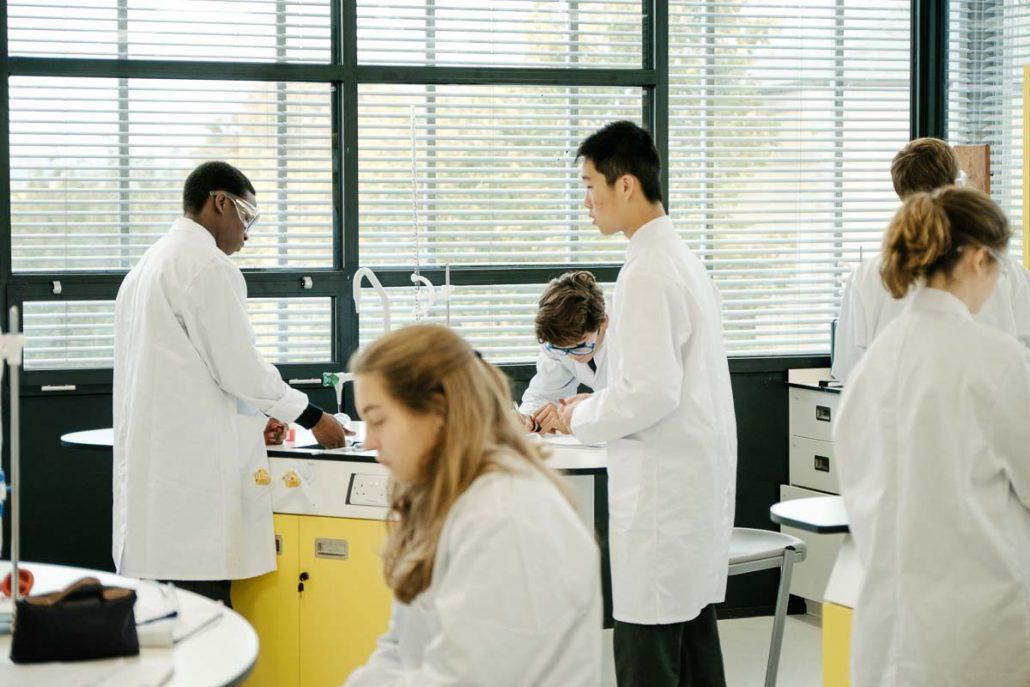
Introduction
Chemistry is an exciting, relevant, rewarding and valuable subject to study. From the food we eat, to the clothes we wear, the water we drink, the medicines we take and even the air that we breath, Chemistry is all around us. At St Columba’s College, Chemistry is delivered with an aim to give pupils an appreciation of this central role which chemical concepts play within every aspect of our lives through a vibrant and supportive learning environment. The key skills developed and core concepts explored through the study of Chemistry will prepare any pupil to take their place in society as responsible, informed, thoughtful and tolerant human beings.
Department Staff
Dr. Sarah Brusey, B.Sc, PhD, PDE (Head of Chemistry)
Grace Mullane, BSc, PDipEd
Overview
Chemistry is taught to all Forms. It is one of four strands of the compulsory Junior Cycle Science curriculum and is available as an optional subject in Transition Year and Senior Cycle.
Junior Cycle
In Junior Cycle Science, Chemistry forms one of the four main strands. The overall philosophy to Junior Cycle Science is a collaborative and investigative approach to teaching and learning, with the development of science literacy. The ‘Chemical World’ strand leads pupils through an understanding of what matter is made of, how matter interacts and how we manipulate matter into useful materials for a wide array of purposes. Pupils will study atomic structure, classification of substances and materials, and how chemical reactions take place, while also considering how our use of materials impacts our environment. The Chemical World strand is not stand alone and the links between the Biological World, the Physical World, Earth & Space and the Nature of Science are continually explored and discussed.
Transition Year
The Transition Year Chemistry course bridges the gap between Junior Cycle Science and Leaving Certificate Chemistry, while also exploring further topics which appear on neither course. Pupils are provided with the opportunity to engage in self-directed learning where they research, debate and present topics within the field of Chemistry that are of direct interest to them. In addition they develop their laboratory skills through completing a variety of different investigations. Pupils will explore a variety concepts such as atomic structure, bonding, chemical formulae, the mole, chemical calculations, SI units, and production of different chemicals, properties of chemicals, crystallography, forensic chemistry (use of practical investigations to solve a murder mystery), environmental chemistry, concentrations of solutions (solubility) and organic chemistry.
Senior Cycle
Chemistry for the Leaving Certificate is a demanding yet rewarding course. Besides gaining a fundamental understanding of core chemistry concepts, the course offers hands-on experience in a wide range of practical techniques while placing an emphasis on the ability to problem solve, both skills which are transferable to other areas of study within the Leaving Certificate and further third level courses. The course is designed to provide a foundation course in Chemistry for those students who will continue their studies in the subject or in related subjects while also providing a relevant course for those who will not study Chemistry any further. The Chemistry course also compliments topics covered by the Biology and Physics courses.
Subject Prizes
The annual Chemistry prize is open to members of Forms IV, V and VI. It is a research-based essay which requires students to demonstrate an ability to explore, critically analyse and form opinions on a topical and relevant area of Chemistry. The prize is awarded to the pupils on the St. Columba’s Day Celebrations in June each year.
ICT
At St Columba’s College, technology is utilised as a valuable tool to enhance the learning process of our pupils. Our e-learning portal ‘FireFly’ has its own dedicated Chemistry section for both Transition Year and Leaving Certificate. Through this platform, students are encouraged to take ownership of their own learning. Learning outcomes, teacher notes, supplementary information and videos, interactive quizzes, online quizzes and other self-assessment tools can be found on these pages, enabling pupils to set their own targets and self-assess their learning. The Transition Year course requires pupils to complete several research projects, where they are must research, analyse and present data through a variety of media.
Leaving Certificate Exam Results
In 2019, 30% of all candidates achieved a H1 (11% nationally), 30% achieved a H2 (15% nationally) and 23% achieved a H3 (14% nationally). All of our Chemistry pupils sat the exam at Higher Level. A large number of our pupils also go on to study Medicine (Chemistry is required for medicine in the UK) or Chemistry related subjects in third level. The standards were maintained during the 2020 and 2021 calculated grading process.
Classical Studies
Department Staff
Stewart, MA, PME
R. Swift, BA, HDipEd
D Higgins, MA, MEd, HDipEd
Overview
Classical Studies is available for study in Forms I (two lessons per week) and in Forms II, III (three lessons per week) and IV (four lessons per week) and in Forms V and VI (five lessons per week). The subject is optional and is examined in Junior Cycle and Leaving Certificate. All classes are of mixed ability.
Junior Cycle
In Form I, pupils receive a good grounding in the ancient world, especially the elements of myth, heroes, storytelling and also topics related to everyday life. In Forms II and III The World of Achilles is explored and Rome: Centre of an Empire in preparation for the Junior Cycle exam and encompassing two Classroom Based Assessments along the way.
Transition Year
The flexibility afforded by the Transition Year Programme allows an examination of the ancient world in a less formal fashvoice in this Form as the students are given a choice of modules to engage with throughout the course of the year. These units of study are then assessed with an end-of-module project and ongoing prep work. Among the topics that can be chosen for study are: Comparative Mythology, The Greco-Persian Wars, Citizenship & Slavery in the Ancient World, An Introduction to Classical Philosophy, Conquerors of Antiquity, The Modern Legacy of Homer’s Odyssey, An Introduction to Greek Drama.
Senior Cycle
The four strands of study in the Leaving Certificate are: 1. The World of Heroes (Odyssey & Aeneid); 2. Greek Drama & Roman Spectacle; 3. Power & Identity (Alexander the Great & Julius Caesar); and 4. Gods & Humans (Mythology, belief and ritual). End-of-term college examinations, classroom tests, essay-writing, debates, conversation classes, class presentations are all part of the preparatory work for the two-and-a-half hour Leaving Certificate examination, during which pupils will answer six questions. There is also a Research Study Report (RSR) that students will submit at the end of Michaelmas term of their 6th Form. This will be worth 20% of their overall Leaving Certificate grade.
Subject Prizes
The Junior, Transition and Senior Classical Studies prizes are awarded after an open competition between the relevant groups of pupils. Examinations, essay-writing, project-work, class presentations may form part of a pupil’s entry.
ICT
Technology is used sparingly and wisely depending on the topic and Form involved.
Leaving Certificate Examination Results
The vast majority of our pupils take the exam at Higher Level and the results compare very favourably with the national performance. In 2019 46% of our pupils achieved a H1, 2 or 3 grade compared to the national average of 40%.
C.S.P.E
Introduction
CSPE’s aim is the promotion of good citizenship among our pupils. This is done primarily by fostering a sense of social responsibility through a human rights perspective. The importance of being an active citizen within the community, the nation and the global context is especially stressed.
Department Staff
Ronan Swift, BA, HDipEd
Peter Stevenson, BA, PGCE
Overview
Civic, Social and Political Education is taught at St. Columba’s within the Wellbeing programme in Junior Cycle. It is compulsory for all pupils in Forms I, II, and III. There is one lesson per week. CSPE is not a senior cycle subject.
Junior Cycle
The CSPE syllabus is encompassed by seven key concepts – Rights and Responsibilities, Human Dignity, Stewardship, Democracy, Law, Interdependence and Development and issues raised are viewed from a human rights perspective. In the Junior Certificate 60% of the assessment is based on the report of an action project where pupils must ‘take action’ on an issue relating to one of the key concepts. This is intended to emphasise the importance of active citizenship enshrined in the subject. The remaining 40% is assessed in an exam. It is the only subject in the current Junior Cert. which is assessed at a common level.
ICT
Pupils in Forms I and II currently use iPads with an eTextbook. The internet is an invaluable resource in CSPE for video footage, news stories, research into citizenship issues and project work.
Design & Communication Graphics
Introduction
Technical Graphics and Design helps the student learn the importance of graphic communication in today’s world. The subject encourages the development of spatial awareness and the use of graphics skills to communicate.
Department Staff
Brian Redmond B.Tech (Ed), HDipSGC, Dip ID.
Department Overview
Technical Graphics is a Junior Certificate subject. Students start the subject in the second form and continue through to the Junior Cert. This is followed at senior school by Design Communication Graphics ( DCG) for Leaving Certification. Technical Graphics and DCG are optional subjects with four or five lessons per week. The subject is taught in a custom designed classroom. Annual Technical Graphics and DCG prizes are open to students. Pupils are continuously assessed through effort marks, homework, class tests and end of term examinations. All pupils have A3 workbooks for prep work outside of class.
Examinations:
Junior Certification is a three hour exam with two papers. Paper A is short questions and paper B is six long answer questions.
Leaving Certification is a three hour exam of three papers. Part A is short questions, part B is four long answer core questions and part C is two long answers from your chosen topics. In addition there is a CAD portfolio to be submitted.
Junior Cycle
Technical Graphics provides the students with the opportunity to develop an understanding of spatial reasoning, the ability to develop graphic communication skills and to understand shape, form and aesthetics.
The subject is divided into two parts. There is the plane geometry which looks at two dimensional shapes such as polygons, circles and tangents. Many of these topics are also linked with the students mathematical course, in such areas, for example as transformation geometry. The subject also looks at solid geometry which is three dimensional graphics and examines solid objects. This area includes such topics such as developments of solids and orthographic projections.
Transition Year
The Design and Communication Graphics ( DCG) course makes a contribution to the student’s practical skills development and a foundation for senior cycle. These skills include graphic communication, creative problem solving, spatial visualisation, design capabilities. They are developed through three principal areas of study: design and communication graphics, plane and descriptive geometries and applied graphics. This programme looks at various modes of communicating design information. Freehand drawing and rendering, along with practical design projects form the core of the programme.
Senior Cycle
The Leaving Certificate Design and Communication Graphics involves comprehending, analysing and communicating information presented verbally or graphically. Problem solving and creative thinking skills are developed through the analysis and solution of problems in both two and three dimensions graphics. Graphics and design are communicated using a variety of media, including computer-aided design (CAD). The main areas of study are: Plane and Descriptive Geometry, Communication of Design and Computer Graphics, and Applied Graphics.
Design and Communication Graphics is assessed at two levels, Ordinary level and Higher level, by means of two assessment components: a student assignment, of which CAD forms a significant and compulsory element ( 40%) , and two part final examination paper.(60%)
Economics
Introduction
Economics is a subject that examines how humans behave in a given situation. It studies how our world works, from how markets operate to subliminal advertising, and from inflation to how we are taxed by focusing on macro and micro economics.
Department Staff
L Carey, BSc, MSc, PGDE
P. Cron, BA, NDipCMA, GDEd
I O’Herlihy, BA, PGDE
Overview
There is a great uptake in this subject on a yearly basis at senior cycle. There are two sets on offer for both form V and form VI. There is no requirement to have studied economics in form IV as the subject is taught from the most basic level. All pupils are taught in mixed ability groups and initially follow the higher level syllabus for the leaving certificate. Generally all will take the higher level paper, and when necessary a small number are directed towards the ordinary level.
The leaving certificate years are taught 5 periods a week, three single classes and one double class. There are two sets per each year group. Mr. Cron teaches Economics to Form IV and L Carey and I O’Herlihy teach the subject to Forms V and VI.
Senior Cycle
Economics is a way of thinking about how people make decisions and interact with each other. In class, we will explore the economic theories and then apply them to current world issues, with a focus on Ireland in particular. It is a subject that keeps itself fresh and interesting and is very rewarding as a result.
The Economics examination at both Ordinary Level and Higher Level consists of a written examination of two and a half hours duration and a project is worth 20% of the overall grade. The brief for the project is issued in the Michaelmas Term in VI Form. The syllabus enables candidates from a wide ability range to demonstrate achievement. The examination paper has a mark allocation of 400 marks in total and consists of two sections as follows:
Section A: 100 marks (25%) – This section consists of nine short response type questions. Candidates are required to attempt six of the nine questions. To obtain full marks candidates are required to attempt the last four questions with a mark allocation of 17 marks each and any two other questions from the remaining five questions with a mark allocation of 16 marks each. Questions range over the entire syllabus. The section is returned with the candidate’s answer book on completion of the examination.
Section B: 300 marks (75%) – This section consists of eight questions and candidates are required to attempt any four of these. All questions require constructed responses and carry an equal weighting of 75 marks each.
Subject Prizes
The economics prize takes place mid May in the final term. The prize consists of a test for one hour. It is based on short answer response questions and critical thinking questions. Pupils are under time pressure to think on their feet and provide accurate information while including the necessary terminology.
ICT
Powerpoint is used in most topics, podcasts, videos and newspaper articles.
Current Affairs
It is important that pupils keep up to date with current affairs. There is an increasing popularity in critical thinking questions at leaving certificate and those pupils who have the interest to read beyond the curriculum will help them in their question analysis. It is recommend to spend 5 minutes a day to either read newspapers, journals, podcasts, radio, or listen to current affair programmes. Some relevant areas of interest:
- Brexit
- Trump
- Sugar tax / Obesity
- Rising rents
- Rising house prices
- Homelessness
- Ireland’s growth rate (26%)
English
Introduction
English is studied by every pupil in the school. It combines study of literary texts and language work.
Department Staff
Julian Girdham, BA (Oxford University), HDipEd (Head of Department)
Liam Canning, BA (Dublin University), HDipEd
Evan Jameson, BA (University College, Dublin), HDipEd
Kieran Kierwan, MA, PGCE.
Robert Pattison, MA, HDipEd.
Overview
All pupils are divided into English sets at random (so sets are not defined by ability). In almost every year there are five lessons a week.
Junior Cycle
The course starts in First Form, though there is no external assessment in this year. A Classroom-Based Assessment oral task takes place in the final term of Second Form, encouraging individual expression and fluency. In Third Form another CBA is completed on a collection of texts, followed by an Assessment Task (10% of final grade, though this was suspended temporarily as a pandemic measure) and there is a terminal state examination (90% of final grade).
Generally, we aim to give a broad grounding in the basics of language and literature, partly through a wide variety of models, and in particular to enthuse our pupils to read a lot, and to think about what they read. This is a crucial element in the development of their own writing. In each of these years there is a weekly supervised reading class in the Library, during which pupils must read books associated with English. First and Second Forms are examined about their reading, and Third Form complete a major book report; all Junior Forms are also given suggested reading lists in association with the Library.
Transition Year
The English TY course was the first in the College, starting in 1994; it focusses on substantial development of pupils’ writing and reading skills in this crucial year, bridging the considerable gap between the Junior Cycle and the Leaving Certificate. This is a year when pupils are really stretched.
In the first term, pupils complete a major Extended Essay (of at least 2,500 words) on at least three different literary works by different authors. While teachers offer advice and guidance, the essay is nevertheless researched, organised and written completely by pupils themselves. In the second part of the course, they complete a Work Portfolio of shorter pieces (stories, personal descriptions, essays) which is submitted at the end of the year. Both the Extended Essay and the Work Portfolio develop the crucial skills of drafting and re-drafting.
During the year a Shakespeare play, a modern novel and a modern play are studied in class. In addition, pupils rotate to teachers other than their regular one in short courses on a variety of subjects, such as Yeats, Chaucer, the history of English, creative writing, the visual image in poetry and the use of film.
At the end of the year at the TY English Evening the best Work Portfolio pieces are read out in front of peers, parents, next year’s TY, and a visiting expert, who comments on the pieces and on the nature of writing. In line with general College Transition Year policy, there are examinations at the end of the first two terms.
Senior Cycle
All pupils sit the Leaving Certificate English exam, and almost all at Higher Level. There are two terminal papers, with equal marks given to Literature and Language. In the literature course, a Shakespeare play, three comparative texts and a substantial selection of poetry are studied over two years. Pupils also have to develop their skill in long and short essay form, and in comprehension, for the final paper.
Subject Prizes
The Department gives five awards each year: Senior English, Junior English, Senior Poetry, Junior Poetry and Knowledge of Shakespeare. Pupils also frequently compete in national competitions in poetry and essay-writing.
ICT
The Department established one of the first subject websites in Ireland in 2006, www.sccenglish.ie. Over the years this has showcased much pupil writing, as well as provided resources, as received several awards for innovation. Along with other subjects, there is a bring your own device policy in the junior Forms, and the internal Firefly Learning system backs these up with resources, as well as for senior pupils. Online work is done extensively in Transition Year, particularly using Google Workspace for Education. The Department is also active on Twitter, and produces revision podcasts for pupils.
Drama
Department teachers are very much involved in drama productions, including the Senior and Junior plays. Periodically there is a production of a play by Shakespeare.
Theatre Expeditions & Lectures
The Department frequently takes pupils to the wide variety of theatrical productions in Dublin. Pupils also go to author readings inside and outside school.
Publications
The Department has published its own textbooks for Junior and Senior Cycle. There are more details on www.sccenglish.ie.
Geography
Junior Cycle
Geography is a compulsory subject up to the end of the Junior Certificate examination. Three lessons per week are taught to Forms I, II and III. The classes are non-streamed and of mixed ability. Pupils complete a common level paper in the Junior Certificate examination. Their learning will be assessed in four main ways:
- Classroom Based Assessment (CBA) 1 in Form II
- CBA 2 in Form III
- Assessment Task in Form III
- Final Examination Form III.
The easiest way to familiarise yourself with the course is via this link: https://www.jct.ie/geography/geography
Senior Cycle
Geography is one of the most popular subjects at Leaving Certificate level with almost half of the year group studying it (2022/23). Geography is allocated 5 lessons per week (including a double lesson). Classes are of mixed ability and pupils generally take the Higher Level paper for their Leaving Certificate (100% in 2022, 84.6% nationally). Pupils are well prepared for examinations and Geography tends to be one of their strongest subjects when results are released in August. In 2022, 47.4% of our pupils achieved an H1 grade (8.9% nationally), 68.5% achieved an H1 or H2 grade (25% nationally), while 100% of pupils achieved H1 to H4 (64% nationally). As a department, we review and refine what we do each year to ensure we improve as we move forward.
Pupils have ample opportunity to acquire the practical skills of a Geographer in observing, presenting and interpreting evidence from a wide variety of sources. A four-day residential fieldwork course to the Burren in Co. Clare takes place in Fifth Form to allow for the preparation of the Geographical Investigation (a written report that includes their primary and secondary data), 20% of the total examination marks. The rest of the course explores a variety of topics from both physical and human Geography before their near three hour long examination at the end of Form VI.
History
Introduction
History is an engaging and academically rigorous subject, very popular with pupils at St. Columba’s, who are encouraged to develop an interest and enthusiasm as well as a knowledge and understanding of Irish, European and world history. Pupils will develop a range of skills, essential for the study of history, but also extremely important for later life, such as conceptual understanding, independent and critical thinking, research, analysis and essay-writing techniques.
Department Staff
Mr. Barry Finn, BA, MA, HDipEd (Head of Department).
Ms. Emma Duggan, BA, MA, PGCE (currently seconded to Junior Cycle Support Service)
Mr. Fergus Robson, BA, PGDE.
Overview
History is taught to all Forms, as a compulsory subject in the Junior Cycle and as an independent, optional subject in Transition Year and Leaving Certificate. In Transition Year, four lessons (2 singles and 1 double) are allocated to two separate History sets. At Leaving Certificate, History is consistently among the most popular of the non-compulsory subjects at St. Columba’s, again with two distinct sets, and all pupils are prepared initially for the Higher Level examination. Five lessons are allocated to History during the Leaving Certificate (3 singles and 1 double).
Junior Cycle
All students in the Junior Cycle study History as a compulsory subject. Forms I, II and III all receive three lessons a week. Classes are mixed ability and typically consist of 12 – 15 pupils. In the Junior Cycle, the syllabus involves the study of a wide range of topics and is basically organised along chronological lines. In Form I we study topics such as Ancient Rome, Pre-Christian and Early Christian Ireland, aspects of the Medieval world, the Renaissance, the Age of Exploration, the Reformation and the Plantations. Form II begin with the Age of Revolutions in the Eighteenth Century and move from there to study O’Connell and Parnell, the GAA and the years comprising of the struggle for Irish independence. The Third Form syllabus is concerned with understanding the modern world and consists of European history 1920 – 1945, the rise of the Superpowers post 1945, as well as looking at the 1960s as a decade of particular historical significance and change. Areas of special study include women in the Renaissance, developments in medicine, crime and punishment and so on.
Transition Year
There are usually two or three sets for History in the Transition Year ranging from 10 – 16 pupils in each set. The course consists of three modules, which are intended to provide a bridge from Junior Certificate to the Leaving Certificate course: the First World War, the USA in the inter-war period and the history of Dublin from Viking times to the present. Pupils examine various aspects of history which serve as a means of introduction to more advanced key skills, such as research, source-analysis, essay-writing, the nature of historical interpretation and field work. Students will be encouraged to use IT and to deliver individual presentations. During the Trinity Term there will be excursions to places of historical interest in the Dublin area.
Senior Cycle
History is a popular and successful subject at Leaving Certificate. In Forms V & VI there are two sets for History (with typically between 10-15 in each set) and we are proud that approximately 33% to half of Columbans opt to study History at Leaving Certificate. The overwhelming majority of students sit the final examination at Higher Level ( typically over 90% ). Students cover four topics from the Later Modern period, one of which is designated as a topic for a documents-based study. Two of the topics are from Irish History and two are from the History of Europe and the wider world, most commonly: Movements for Social and Political Reform in Ireland (1870 – 1914), Sovereignty and Partition in Ireland (1912 – 1949), Dictatorship and Democracy in Europe (1920 – 1945) and the USA and the Wider World (1945 – 1989). 20% of the final result is in the form of coursework (entitled the Research Study Report) which is based on the student’s individual research into a subject of their choice. The workload is relatively heavy for the study of History; assessment is carried out by means of regular homework, class-work, effort marks and regular tests and examinations. We attempt to monitor students’ work carefully and take steps to enable improvements to be made and enable pupils to achieve their full potential as budding historians.
Subject Prizes
History Prizes are awarded annually to outstanding practitioners in the Junior Cycle, the Transition Year and the Senior Cycle and the department aims to foster enjoyment and success in the subject by the use (when deserved!) of distinctions and commendations. Pupils may choose and write an essay on any topic of interest to them – some of this year’s topics include the Battle of Waterloo, the fall of the Berlin Wall and the Korean War.
ICT
Technology is used consistently in the History classroom to enhance teaching and learning. Our e-learning portal ‘FireFly’ has it’s own dedicated History section for all year-groups. These pages include teacher notes and presentations, links to appropriate video, work samples, exam papers and so on. Pupils in the junior years use e-books on their tablets and all year groups are encouraged to use technology to engage in independent research and in the compilation of project work and class presentations. Audio-visual resources are used very regularly to enhance understanding and on-line History games provide a fun but constructive learning tool.
Exam Results
History results at Junior and Senior Cycle are consistently excellent. For example, for Leaving Certificate 2019, all pupils sat the Higher Level paper and 87% of candidates scored an H1, H2 or H3 grade. 55% scored an H2 or H1 grade and 14% scored an H1. The average points achieved by a pupil of Leaving Certificate History was 86. The national average for H1 grades was 5%.
Expeditions
The History department, often in collaboration with the Science or Modern Language departments, organises expeditions to places of historical interest both near and far – in 2015 we organized a tour of Paris in conjunction with the Modern Languages Department, in 2016 we embarked on a cultural tour to Italy, and in 2017 we visited London together with the Science Department. In 2018, we visited Krakow and in 2019, again with the Modern Language department, we went to Seville. A trip to London took place in January 2020, in conjunction with the Science department.
Irish
Introduction
The Department of Irish (Roinn na Gaeilge) aims to develop in our pupils the four main skills required to allow communication in the language: speaking, reading, writing and listening, and to foster in them a positive attitude to the language, its literature and culture. Teaching and learning are carried out predominantly through Irish
Department Staff
Alison Maybury (BA, HDipEd.)
Lisa Lynch (BA, PME)
Overview
Irish is taught from the Primary form through to Form VI. There are two sets in each form, one higher level, one ordinary. Pupils in Forms Primary, I, II, III and Transition Year have four lessons per week, those in Forms V and VI have five. Irish is a compulsory subject in schools recognised by the Department of Education. Some pupils may be given an exemption from Irish if they fulfil guidelines laid down by the Department.
Junior Cycle
Pupils in Forms Primary and I have classes together and follow the Department guidelines for preparation for the new Junior Cycle Student Award. They are placed in the higher or lower set according to their ability. Pupils will be appraised in classroom-based assessments on their communicative competence (oral, aural and written), language and cultural awareness, and their development of self-awareness in relation to their own learning. They will also sit a State examination at the end of Form III.
Teaching and learning for Forms II and III follow the guidelines for preparation for the Junior Certificate examination which takes place at the end of Form III. Pupils are placed in the higher or lower set according to their ability. Topics covered (e.g. family, home and area, school, sport, hobbies, holidays, social media) are ones that relate directly to their own lives. Communication skills in Irish, both oral and written, are emphasized in our teaching and learning structures and practices. Pupils learn through activities such as role plays, games, discussions, reading and written exercises and the use of online resources.
Transition Year
Pupils in the Transition Year are placed in the higher or lower set according to their ability. As there are no set guidelines for course work, teachers and pupils have the freedom to focus on areas that may not have been covered in the Junior Cycle and to expand on ones that they have particularly enjoyed before. Pupils engage in research topics and often make presentations to their classmates, an activity that develops their confidence in the Irish language. Other activities include literature, music, dance, film, Irish culture and participation in writing, producing and performing in the annual Irish language play. Written examinations are taken by both sets in the first two terms and in the final term pupil-performance is assessed on the basis of their project work, exam result averages and effort during the year.
Senior Cycle
Teaching and learning for Forms V and VI follow the guidelines for preparation for the Leaving Certificate examination which takes place at the end of Form VI. Pupils are placed in the higher or lower set according to their ability. Leaving Certificate Irish builds upon the language developed during Junior Cycle. All four language skills are further developed in the learner. The oral component of the exam is worth a very substantial 40% so there is a heavy emphasis on the spoken language in class; pupils can avail of opportunities to practise the language outside the classroom with each other and their teachers e.g. in the Ciorcal Cainte. The written component of the exam touches on topics close to the pupils’ life experiences and on current affairs. Aspects of literary works are studied at Ordinary Level while at Higher Level these same works and additional material are studied in greater detail.
Subject Prizes
Pupils can compete for the Reverend B.W. N. Walsh Senior and Junior Irish Prizes during the Hilary term each year. The format for this varies and can include a written submission on a research topic, an essay, an oral presentation or an exam on Irish literature. A prize is awarded annually to the Transition Year pupil who performs best during the course of the year.
ICT
Every classroom is equipped with a data-projector computer which is used regularly during lessons. Pupils can use their own devices in class for research projects and interactive games. They often use Powerpoint when making presentations to their class. Forms Primary, I and II use iPads instead of textbooks and use many additional apps on these in the course of their learning. YouTube is used for short films and songs. Pupils watch appropriate programmes on the Irish language television channel, TG4. The resources on the College Irish website are often used during lessons.
Mathematics
Introduction
Mathematics is a core subject throughout the school and all pupils are prepared for public examinations at both Junior Cycle and Leaving Certificate levels. The department consists of five very well qualified and experienced Mathematics teachers, 4 of whom teach the subject full-time.
Department Staff
- Daron Higgins (Mathematics), MA, MEd, HDipEd
- Dr. Mary Singleton (Mathematics & Physics), MSc, PhD, HDipEd, DipEdMan
- Julie Robinson (Mathematics), BA, HDipEd
- Lisa Carey (Mathematics, Business & Economics) BBs, MSc, PDHipED, PDMT
- Cormac Brady (Mathematics) M. Phil, PDGE
- Greg Clark (Mathematics)
Overview
Each form has 5 lessons per week, each of 45/40 minutes length. All forms are set as attainment groups. The top two or three sets in each year will aim to undertake Higher Level exams. Different styles of books and resources are used for the different ability levels.
Junior Cycle
Mathematics is a compulsory subject for Junior Cycle and each pupil, across all forms, are allocated 5 lessons per week.
Transition Year
The department prides itself on having a well-rounded transition year programme, with an emphasis on academic work. We are continuing to improve and refine our scheme of work, to be flexible to the needs of our pupils.
Prizes
Each year prizes are awarded as the result of examinations in Junior Maths (Forms I-III) and a Senior Maths (Forms IV-VI).
ICT
The department has access to a number of digital projectors, and access to useful software packages. It has use of an ICT suite with terminals for the whole class. Various websites are used as teaching aids when appropriate. With the introduction of iPads in the Junior forms, we have been able to expand our ICT to incorporate the benefits of these devices.
Aims of the Mathematics Department
We aim to develop:
- a pupil’s potential to the full
- a positive attitude to mathematics as an interesting and useful subject
- an appreciation of the creative aspects of the subject and of its aesthetic appeal
- an ability to think logically and clearly in mathematics with confidence and flexibility
- an appreciation of pattern and relationships in mathematics
- mathematical skills and knowledge and the ability to recall essential facts quickly
- an awareness of the uses of mathematics beyond the classroom, in business, the sciences and other disciplines
- persistence and perseverance through sustained work
- an ability to work on one’s own and to develop the skills necessary for mathematics at leaving certificate and university
- the confidence and ability to communicate mathematically both orally and on paper
- an ability to use ICT when appropriate
- the ability to work as a member of a group
- more open-ended questioning and prep
- an interest in the history of mathematics
- pupils ability in the use of calculators and ICT when appropriate
Department of Education Inspection
In 2009 the mathematics department underwent a Department of Education Inspection. The findings of this were extremely positive and complimentary and can be read here.
Modern Languages
Introduction
French and Spanish are offered through the College and it is compulsory to study a Modern Foreign Language to Leaving Certificate, unless a pupil has a special dispensation.
Department Staff
Clotilde de Fréin, MA.LLCI, MA.FLE, CAPES, Head of Modern Languages (French)
Michael O’Shaughnessy MA (French and Spanish)
Ann Kilfeather BA, HDipEd (Spanish and French)
Tristan Clarke BA, PGDipEd (French)
Overview
The department aims to provide learning that motivates, inspires and challenges, whilst at the same time increasing self-esteem and building linguistic confidence. We aim to enable pupils to express themselves with confidence and flair both in speaking and writing. We also attach great importance to the accurate use of language and a clear understanding of grammatical concepts, without which creativity is stifled. We aim to transmit our love of languages (and the cultures to which they belong) and make pupils want to continue discovering languages in one form or another after leaving St Columba’s College.
Junior Cycle
Pupils choose between French and Spanish at the beginning of 1st Form and continue with their language to the end of 3rd Form. The Junior Cycle course targets the skills of listening, reading, spoken production, spoken interaction and writing. Pupils are encouraged to reflect on how the target language works (structures and grammar) and how this compares to their own language. In the same spirit, they are expected to develop an awareness of the target culture, relating it to their own country and culture. There are two classroom-based assessments. The first is an oral presentation in 2nd Form on an aspect of the target culture. For the second, pupils must develop a language portfolio, containing a broad range of items, such as written texts, projects, audio-visual materials, learning logs, student reflections and learning goals. The final assessment takes the form of an examination. At the end of the Junior Cycle, pupils should be able to communicate confidently and effectively in the target language.
Transition Year
In Transition Year, pupils develop the study skills necessary for Senior Cycle. Learning is largely enquiry-based and we aim to promote a spirit of discovery. We have two distinct but equally important aims: the first is to develop proficiency in the language of choice. Pupils will gain an ability to transmit information and ideas and be able to put forward their point of view. The second is to develop an appreciation of the target culture: its history, geography, politics, contemporary culture, literature, songs and cuisine. Spoken expression is especially important and commands 50% of the MFL TY grade. Pupils make several spoken presentations over the course of the year. Students of French are given the opportunity to receive the French DELF Diploma. The culmination of the TY year is the Modern Language Evening, a series of presentations on Francophone / Hispanic topics, poetry readings and videos made by the pupils. The student who gives the best presentation is awarded the Alyn Stacey Cup.
Senior Cycle
We prepare pupils for the Leaving Certificate over a two-year course of five lessons per week. In addition, pupils in 6th Form have a weekly oral class with a native speaker in preparation to the Oral examination. On average over 80% of pupils take Higher Level. The Spanish and French syllabi are similar and are examined over the four key areas of speaking, listening, reading and writing. Topics are rooted in contemporary culture, and cover areas such as the life of young people, education, science, the environment, the Internet, school life, the future, social issues etc. Pupils learn how to convey ideas with some level of complexity and examine issues from a variety of angles. Classes are conducted in the target language and pupils actively participate in spoken discussions.
Subject Prizes
There are Junior and Senior prizes in both French and Spanish. These are awarded on the basis of an examination.
ICT
ICT is key to our philosophy of teaching. We make extensive use of the Firefly learning platform, as well as Google Suite, for sharing resources, setting / collecting assignments and recording grades. Pupils use ICT for language blogs, research, presentations, etc. We regularly look at online news sites in class and pupils are encouraged to research these independently. Various websites and apps such as Kahoot, Duolingo, Prezi, Edmodo, WordReference are an enormous support for teaching. Judicious use of ICT adds variety and helps to engage the learner.
Extra-Curricular Language Support
The Modern Foreign Languages Society regularly takes groups to see the latest foreign language films and take part in cultural events. We also hold an enormously successful Language Play Evening, attended by the whole school, where pupils perform in all the languages taught in the College. The Fifth and Sixth Forms take part in the national Spanish debates and French Joutes Oratoires. In short, we hope to instil in pupils our life-long love of languages and for the countries in which they are spoken.
European Day of Languages
The wealth of European and world languages is celebrated every year on 26th September with a variety of events. The 1st Form take part in a language treasure hunt around the College grounds in which they have to find and match up words in French, Spanish and Polish. Fourth Formers, who are not native English speakers, give taster lessons in their own language through French or Spanish (we have had, amongst others, Korean, Mandarin, Japanese, Ukrainian, Polish, Russian, Italian, German, Yoruba, Swahili, Catalan and Euskera). Various language quizzes are held, and the lunch menu is posted in five languages. Other events have included a tongue-twister competition, “guess the language”, flamenco dancing and cooking (tortilla / crepes) workshops.
Music
Introduction
Music is an integral part of College life. Music lessons are available to all students in the College, and performance is encouraged at concerts and soirees. Music as an academic subject is taught for Junior and Leaving Certificate.
Department Staff
Caroline Duggan (Head of Department)
Additional Music Staff
K.Snowe BA, (piano), T.Lawlor ALCM (guitar), E.Shannon MA (singing), M.Buicke BA (singing), A. Brady B.Mus (singing and piano), D.Hatch B.Mus, (clarinetand saxophone) R.Scarlett B.Mus (percussion), M.O’Reilly ALCM (flute), R.Sheldrick (brass), B.Robinson (violin).
Overview
At present, music is taught to all primary and first form students for two periods a week, and they then choose between music and art for Junior Certificate. This is three periods per week. Music is an option for Transition Year students, and they have four periods a week, and Leaving Cert students are taught for five periods per week.
Junior Cycle
Junior Certificate music is a wide and varied course. A basic knowledge of music theory is essential, and this is covered in the Michaelmas term of second form.. There are three different syllabi, Set A,B and C, so no consecutive years are the same. Each Set has eight Set Songs and three Set works, in Baroque, Romantic and 20th century style. Students study the Irish music tradition, chord progressions, melody writing and triads. The practical examination is worth 25% and is held in April. Students can perform four pieces in one activity or two pieces in two different activities. This encourages performance in duets and small groups
Transition Year
Music is available to all Transition Year students as a choice subject and it is not essential to have a knowledge of written music. The course is more music appreciation based. If there are enough performers and instrumentalists in the group they can form an ensemble or band and work together for one period a week. Different styles of music are studied throughout the year ranging from early music to Beatles. In the final term a basic course in music technology is covered so students are familiar with the Sibelius programme. Outings to concerts and other musical performances take place during the year.
Senior Cycle
Music for Leaving Certificate is wide and varied. There is a Listening paper of 1 hour 30 minutes which has a question on each of four Set Works that are studied over the two year cycle. This paper also has a Listening Section on Irish music, an Irish music essay and a Listening question on music that has not been previously studied, which tests their aural skills. There is also a Composition paper of 1 hour 30 minutes where students have to write a 16-bar melody and provide and write the harmony for a given melody. The music practical examination is held in April and, for strong performers, is worth 50% of the marks, and students do a recital of six pieces. For those students who are not so strong in performing, there is an option to perform four pieces for 25% and do a music technology examination worth another 25%. This is taught during the year to those taking that option.
Subject Prizes
The Music Prize Concert is held on the final Sunday of the Trinity term. There are six prizes available and prizes are awarded for performance at this concert. An outside adjudicator is invited to give the decisions, and prizes are awarded on St. Columba’s Day
ICT
YouTube is essential for clips in every field of music. Students also use technology for power point presentations. ipads are used in the junior classes and preps can be sent to students using Firefly.
Choir
There are two main choirs in the College – the Chapel Choir, that meet once a week and prepare music for Evensong, and Sine Nomine, who meet once a week and prepare music for Matins, and other concerts throughout the year. There are choir trips roughly every two years, the most recent being to Amsterdam in 2016. See more information on College choirs here.
Musicals
The College puts on a musical roughly every two years, involving students of all ages. It is a great opportunity for soloists and others who love the stage. In recent years OKLAHOMA (2017) and Grease was performed (2019) as College musicals.
Orchestra
Michelle O’Reilly, who teaches flute in the College, also takes an orchestra practice once a week, and they have performed at two concerts already this year. It is a great opportunity for instrumentalists to make music together.
For more information on extra-curricular music endeavours click here.
Physical Education
Introduction
Physical Education at St.Columba’s College aims to educate young people in and through the use of the body and its movements, developing physical competence so that pupils are able to move efficiently and safely and understand what they are doing.
Department Staff
S-J Johnson BEd, BTEC ND Physical Education & Geography
H Havenga, BEd
Overview
Physical Education is compulsory in Forms I & II and in Form IV, a double lesson per week. In addition in Form IV it is optional to study GCSE PE short course, 4 lessons per week: two singles and one double. Physical Education is also optional in Form V, a double lesson each week.
Junior Cycle
Our specialist and experienced physical educators work together to ensure that the PE curriculum at St. Columba’s College seeks to advance the social, emotional, intellectual and physical development of the child through an appropriate range of physical activities delivered through a spectrum of teaching styles.
Transition Year
Physical Education in transition year is studied in a six week module, where aspects of the Junior Sports Leaders Award are introduced cumulating in the pupils teaching a ten minute micro lesson to their peers. In addition transition year pupils have the option to study GCSE PE short course. This examination is 40% theory and 60% practical activities and coursework comprising analysis of performance and writing a six week personal exercise programme.
Senior Cycle
Pupils in Form V who choose to study Physcial Education follow aspects of the proposed Leaving Certificate programme of study, which is under review for introduction for first examination in 2021.
ICT
iPads are integrated in the Junior Cycle curriculum through specialist apps and for those pupils who opt to study GCSE PE they are an integral in the analysis of performance element of the course.
Physics
Introduction
Physics is the study of the world around us and the physical laws which govern it. Through studying physics the pupils develop an appreciation for the scientific method and expand their powers of analysis and logic.
Department Staff
M Singleton, MSc PhD H Dip Ed, Dip Ed Man
K Hennessy, BSc
Overview
Physics is taught throughout the school. It is in forms I to III as part of Junior cycle science and a separate optional subject in forms IV, V and VI. In form IV the allocation is one double and two single periods per week. In forms V and VI this is increased to one double and three single periods. In Senior cycle the double class is given over predominantly to experimental work.
Junior Cycle
The ‘Physical World’ is one of the four strands of the new Junior Cycle Science specifications, while ‘Earth & Space’ is also included as a strand. The overall philosophy to Junior Cycle Science is a collaborate and investigative approach to teaching and learning, and the development of science literacy. At Junior Cycle the foundations of physics are developed, including study of measurement, energy, forces, electricity and much more.
Transition Year
The course is broad based and aims to deal some of the most fundamental topics of physics (many of which have been introduced in junior cycle) but in greater detail. Much of the focus is on improving the pupils experimental skills,
computational abilities, analysis of results using both verbal and graphical means and communication and presentation skills. The scheme of work is designed to be flexible and the topics covered will vary from year to year. In all cases we attempt to focus on aspects of the topics not covered at leaving certificate course while building on the pupils mathematical skills and conception knowledge. The modules include – Motion and Energy, Heat and Thermodynamics, Optics and Light, Medical Physics, Electricity, Electronics as well as external project such as Crann Nano technology, ESA Cansat and Robotics.
Senior Cycle
The aim of the course is to foster an interest in Physics and encourage independent self-directed learning through exposure to the ideas and principles of a range of physics topics. The pupils are taught in mixed ability groups and initially all follow the higher level syllabus. The emphasis is always on physics as an experimental science and the pupils carry out experimental work in all topic areas. The pupils are encouraged to consider topical areas of physics and to arrive at informed opinions. The Leaving Certificate results are consistently good. In 2024, 60% of our pupils obtained a H1 or H2 grade as compared with 30% nationally.
Subject Prizes
The Physics prize is held each year in May. It is awarded based on the results of a challenging paper set on work completed in form V. The prize is open to Form V and Form VI pupils.
The TY subject Prize is awarded based on excellence and effort through out the year including performance in academic exams, participation in both internal and external projects and overall interest in the subject,
ICT
Powerpoint presentations are used extensively in the delivery of course material. Datalogging is used for some experimental work. Where appropriate pupils are referred to websites and relevant material is linked into the presentations. Feedback is provided via firefly which also contains all course material and a range of resources and revision material is available on firefly. In Transition Year lessons are delivered using a variety of media, the focus in on variety combining online activities using firefly, physics website and external resources such as Virtual Physics Lab and pHet Simulations. Pupils are provided with a workbook but also assignments / lab activities are prepared and shared using Google drive.
Religious Education
Introduction
In Religious Education (RE) pupils will learn about what people believe, why they believe and how these beliefs influence their own lives, the lives of others and the world around us. They will explore how many religions, particularly Christianity, have shaped the world we live in today.
Department Staff
Reverend D. Owen BSc, BTh,
P. Cron, BA, NDipCMA, GDEd
Overview
All pupils in both junior and senior cycles have one RE class per week. This forms a small but important part of the overall education pupils receive at St. Columba’s. RE is not currently offered as a subject for Junior or Leaving Certificate.
Junior Cycle
For the Junior Cycle, there are a wide variety of topics covered. These include Learning about the Bible, it’s origins, structure and how to read and understand it. An overview of the Old Testament and a detailed look at the Gospel of St. Matthew. We then progress to looking at Communities, both religious and Secular and the relationship between communities of different Faiths. There is an introduction to the subject of Morality, looking at the role of religions in shaping Moral views and pupils will learn how to think through various Moral issues and be encouraged to develop their own thoughts on these issues. We look in detail at two major world religions, Islam and Judaism.
Senior Cycle
For the Senior Cycle, there is an introduction to Philosophy, from its origins in Ancient Greece to how it is important in questioning what we experience in today’s world. Pupils will learn about the origins of religion and the search for meaning that people have always had. We look in depth at the life and ministry of Jesus and his impact on the world ever since. An in-depth study of Morality forms an important part of the curriculum, including the current debates over Abortion, Cloning and Euthanasia. Specifically, pupils are encouraged to look at arguments for and against and to try to understand as fully as possible the point of view that is different from the one they may have. The study of major world religions continues with an introduction to Hunduism and Buddhism, as well as a study of the ‘New Atheism’ movement.
ICT
iPads are used to provide easy access to the Bible, along with tools to make highlights and notes from the text. Firefly is used to access Prep that is set and to keep a record of progress made.
Social, Personal and Health Education
Introduction
The Social, Personal and Health Education (SPHE) programme at St. Columba’s College provides pupils with a unique opportunity to develop the skills and competencies to learn about themselves and care for themselves and others, and to make informed decisions about their health, personal lives and social development.The principal teaching methods used in our SPHE programme are based on experiential learning methods.
Department Staff
Alison Maybury B.A. H. Dip. Ed;
L Murphy BA
Overview
SPHE is taught in all forms and is compulsory for all pupils.One class period of 40-45 minutes per week is allocated in all forms. Forms Primary to Form III are taught SPHE in their form groups and are of mixed ability. Sets in Forms TY to VI correspond with the Mathematics set and so numbers can vary from set to set. These pupils are streamed according to whether they are studying Mathematics at Higher or Ordinary Level.
Junior Cycle
The curriculum for SPHE in the Junior Cycle (Forms I to III) is presented in ten modules, each of which appears in each year of the three year cycle. Topics include belonging and integrating, self-management, communication skills, physical health, emotional health, relationships and sexuality, influences and decision-making, substance abuse and personal safety. The programme is of a spiral and developmental nature and topics and skills are revisited under different headings and from a variety of perspectives as pupils move up the school. During Bullying Awareness Week and Mental Health Week, we avail of the opportunity to discuss further events and issues raised by the various activities.
Transition Year
As part of the Columban Award Scheme, pupils study emergency aid, learning how to treat bleeding, shock, burns, fractures, strains & sprains, epilepsy, fainting, diabetic emergencies, angina and heart attack, stroke, asthma and choking. They also learn how to administer CPR and how to use a defibrillator (AED). In Relationships and Sexuality Education, pupils discuss what we value in relationships, healthy relationships, the implications of sexual activity, fertility, understanding female fertility and contraceptive methods. During Bullying Awareness Week and Mental Health Week, we avail of the opportunity to discuss further events and issues raised by the various activities.
Senior Cycle
Pupils study topics under headings including personal health, emotional and social health and relationships and sexuality education. They are challenged to reflect on their attitudes to their own health as they approach adulthood. Topics covered include healthy diet, budgeting, personal safety, cancer and relationships and sexuality, drugs and their career guidance.
ICT
Recommended websites such as www.b4udecide.ie, www.spunout.ie, www. reachout.ie are used, along with relevant YouTube clips.
Special Educational Needs
Introduction
We aim to support pupils with learning difficulties and disabilities so that they can achieve their academic potential and protect their wellbeing.
Parents are asked to provide assessment reports before the pupil arrives in the school so that we can provide adequate and timely support.
Department Staff
Suzanne McEneaney BA (mod) PGCE MEd
Keith J Ryan BA PCE PDE (SIE)
Overview
We assess all new pupils in literacy using standardised spelling and reading assessments, maths levels are assessed in maths classes in the first few weeks. When these assessments indicate a need for specific work, or there is a diagnosed difficulty, we timetable support classes and coordinate with subject teachers to come up with a programme to support the students. The department liaises extensively with parents and outside agencies such as the State Examinations Commission when applying for Reasonable Accommodations in certificate exams, educational psychologists, speech and language therapists, occupational therapists and others.
Junior Cycle
Depending on the individual needs literacy, numeracy, study skills, subject support or social skills will be addressed. If assistive technology is required it will be introduced and practiced.
Senior Cycle
Senior Cycle programmes focus on subject support, study skills and exam accommodations where needed.
ICT
ICT can be an important aid for students with specific learning difficulties. We follow the State Exams Commission criteria for use of assistive technology in school exams and make applications for eligible candidates.

